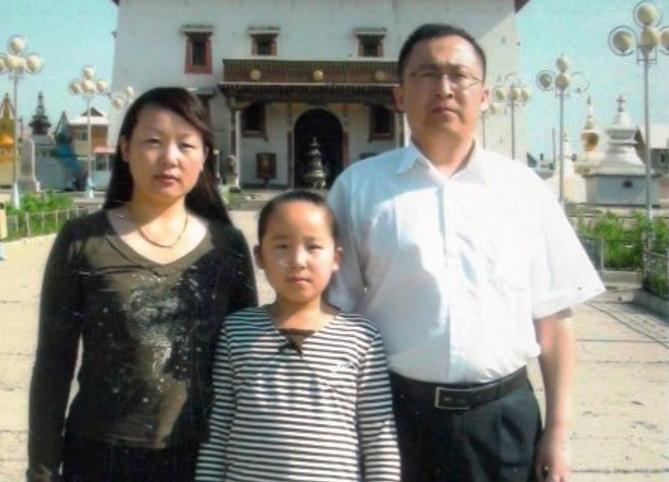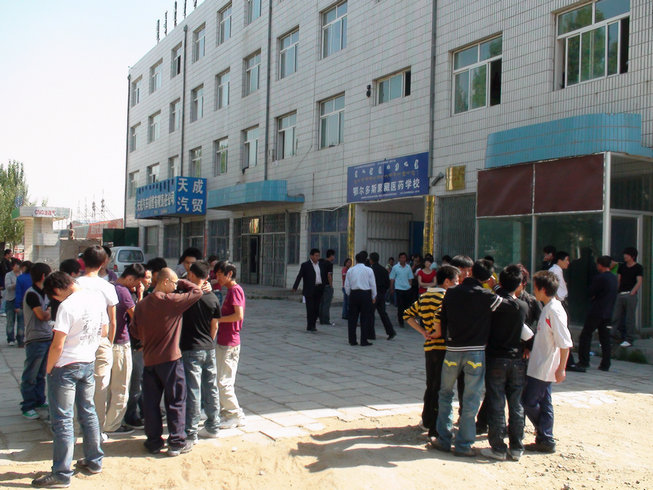| SMHRIC |
| May 10, 2013 |
| New York |
 |
|
|
Batzangaa along with his wife and daughter in
Ulaanbaatar, Capital of Mongolia in 2009 while seeking asylum with
UNHCR
|
|
 |
|
| Students of Ordos Mongol-Tibetan Medical School after class. The school was shutdown shortly after its principal Batzangaa fled China to Mongolia. |
After a two-week detention, Batzangaa and his family members were given a notice of imprisonment by the Ordos Municipality Public Security Bureau stating that he would be imprisoned for three years in jail effective April 27, 2013, without reprieve.
In May 2009, Batzangaa, along with his wife and daughter, fled China to the independent country of Mongolia in an effort to escape possible persecution due to his plans for organizing public demonstrations to protest the authorities’ illegal confiscation of the school’s campus grounds.
In October 2009, Batzangaa was arrested at the front entrance of the United Nations Refugee Agency Liaison Office building in Ulaanbaatar, Mongolia, while seeking refugee status. Batzangaa’s wife Ms. Bayanhuaar and their then nine-year-old daughter Chilguun were also arrested in Ulaanbaatar shortly afterwards. The family was deported back to China on the following day. The arrest and deportation were secretly carried out by four Chinese police officers and a dozen Mongolian security personnel in a joint operation between the governments of Mongolia and China.
On January 27, 2011, Batzangaa was sentenced to three years in jail with four years reprieve by the Dongsheng District People’s Court, Ordos Municipality for the charge of “diverting a special fund.” Batzangaa pleaded not guilty at the trial. Since then, Batzangaa and his family members have been placed under what is called “residential surveillance,” a form of house arrest.
“Around 11 AM, April 13, six policemen from Hohhot (capital of Southern Mongolia) and more than a dozen policemen from Guangzhou raided our hotel room and arrested us,” Bayanhuaar described to SMHRIC. “Seeing so many police for the first time in his life, my one-year-old son was extremely scared and crying loudly out of fear.”
“They took each of us to the toilet and searched us thoroughly. My 13-year old daughter and one-year old son were also taken to the toilet and searched for possible hiding of any cell phone used to contact foreigners,” Bayanhuaar added.
According to Bayanhuaar, the main accusation brought against Batzangaa by the Chinese authorities is that Batzangaa arranged a meeting with a foreign official in Guangzhou.
“During the interrogation against myself and my children, after we were brought back to Ordos, they asked intensively about an alleged meeting between my husband and a foreign official,” Bayanhuaar stated when asked by SMHRIC about the authorities’ reason for the arrest. “I have no knowledge about any such meeting.”
To further investigate the case, SMHRIC reached Batzangaa’s attorney, Mr. Huhbulag, who was traveling in Shanghai.
“I have no knowledge about Batzangaa’s trip to Guangzhou, but I heard of his arrest and imprisonment.” Huhbulag told SMHRIC that he is planning to visit Batzangaa and his family around May 12, 2013.
“In addition to the common difficulties practicing law in China, I as a Mongolian lawyer must deal with an extra layer of difficulty especially when I represent any Mongolian client,” Huhbulag told SMHRIC. Due to his involvement in sensitive cases of Southern Mongolian dissidents as defense lawyer, Huhbulag has been listed as a person “threatening state security” (see http://www.smhric.org/news_306.htm for details) by the Chinese authorities, and has been warned and even threatened by the authorities not to represent Batzangaa.
“No matter what, I am still the legal attorney of Batzangaa. It is my duty to handle his case until a just resolution is reached,” Huhbulag is determined to prepare for the appeal in higher courts despite the tremendous amount of pressure from the Chinese authorities.
Currently, Batzangaa is held at the Ordos Municipality Dongsheng District Detention Center. Prison visits by the family members is severely restricted.
“I was allowed to visit him only once on April 28. He was handcuffed behind his back, and we talked over the phone through a thick glass window for about 10 minutes until the phone was disconnected,” Bayanhuaar said. She worried about his health and the possibility of torture by the prison guards and inmates.
“We often receive terrifying phone calls after midnight, claiming that the mafia is on its way to us to cut our heads and limbs off,” Bayanhuaar, who was left under the authorities’ “residential surveillance” along with her two children, said worryingly.




 Beyond
Great Walls: Environment, Identity, and Development on the Chinese
Grasslands of Inner Mongolia
Beyond
Great Walls: Environment, Identity, and Development on the Chinese
Grasslands of Inner Mongolia China's
Pastoral Region: Sheep and Wool, Minority Nationalities, Rangeland
Degradation and Sustainable Development
China's
Pastoral Region: Sheep and Wool, Minority Nationalities, Rangeland
Degradation and Sustainable Development The
Ordos Plateau of China: An Endangered Environment (Unu Studies on
Critical Environmental Regions)
The
Ordos Plateau of China: An Endangered Environment (Unu Studies on
Critical Environmental Regions)